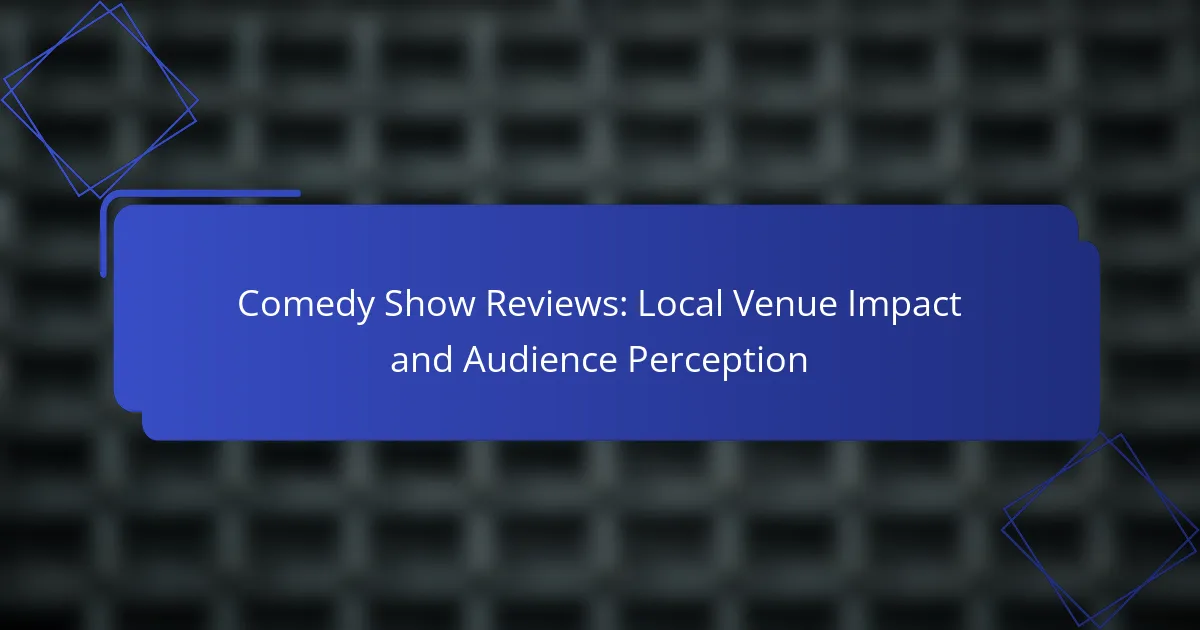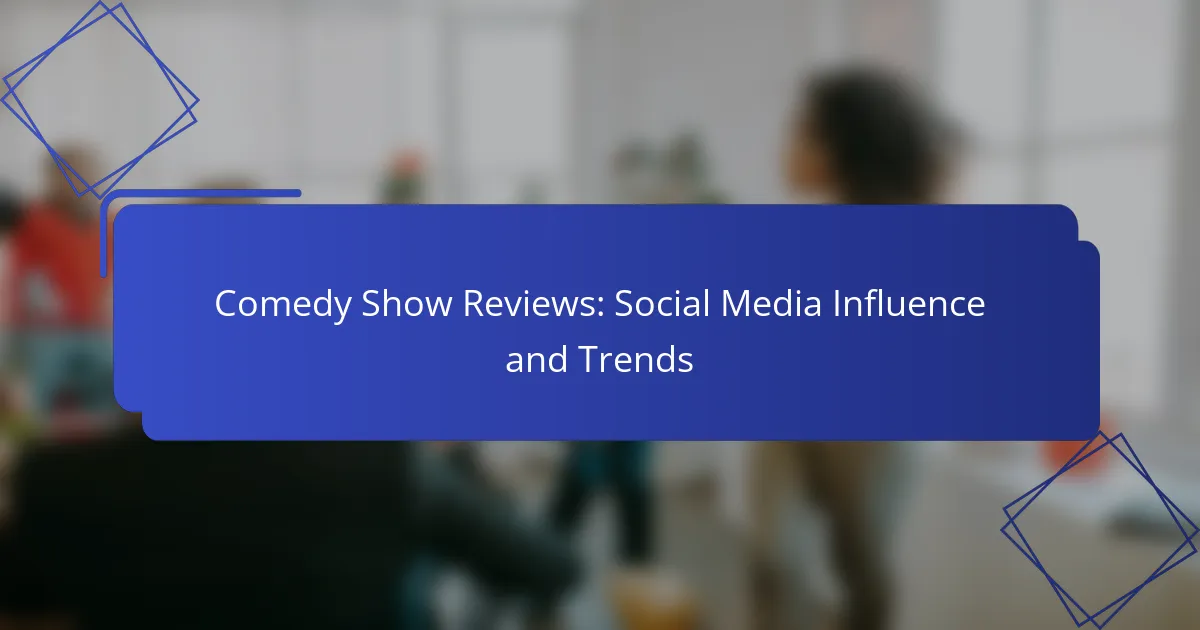The impact of local venues on comedy show reviews is profound, as they shape the audience’s overall experience through factors like atmosphere and accessibility. Audience perception is influenced not only by the comedians and show format but also by the venue itself, which can enhance or detract from the enjoyment of the performance. Consequently, reviews play a critical role in shaping public perception of these venues, affecting both attendance and the reputation of the performers.
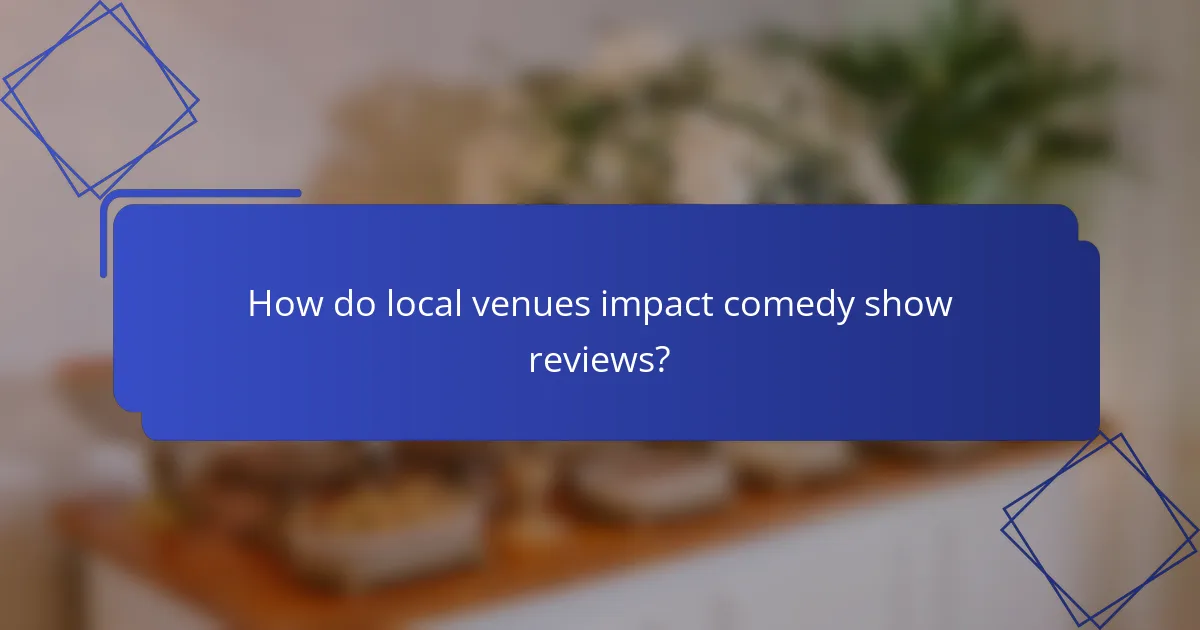
How do local venues impact comedy show reviews?
Local venues significantly influence comedy show reviews by shaping the overall experience for the audience. Factors such as atmosphere, accessibility, and location reputation play crucial roles in how attendees perceive and enjoy the performance.
Venue atmosphere influences audience enjoyment
The atmosphere of a venue can greatly enhance or detract from the comedy experience. A lively, intimate setting often encourages audience engagement, while a sterile or overly large space may create distance between performers and attendees. Elements like lighting, seating arrangement, and acoustics contribute to this atmosphere.
For example, venues with comfortable seating and good sightlines typically receive better reviews. Comedians thrive in environments where laughter is easily shared, making the audience feel more connected to the performance.
Accessibility affects audience turnout
Accessibility is a key factor in determining how many people attend a comedy show. Venues that are easy to reach via public transport or have ample parking tend to attract larger crowds. Additionally, compliance with accessibility standards for individuals with disabilities can expand the audience base.
For instance, venues that offer wheelchair access and assistive listening devices are more likely to receive positive feedback from a diverse audience. Ensuring that a venue is welcoming to all can significantly impact overall attendance and reviews.
Location reputation shapes perceptions
The reputation of a venue’s location can influence audience perceptions before they even step inside. Areas known for vibrant nightlife or cultural activities often attract more visitors, which can enhance the perceived value of a comedy show. Conversely, venues in less desirable neighborhoods may face skepticism.
For example, a comedy club located in a trendy district may be viewed as more appealing than one in a rundown area. This perception can affect ticket sales and reviews, as attendees often consider the overall experience of the night out, including safety and ambiance.
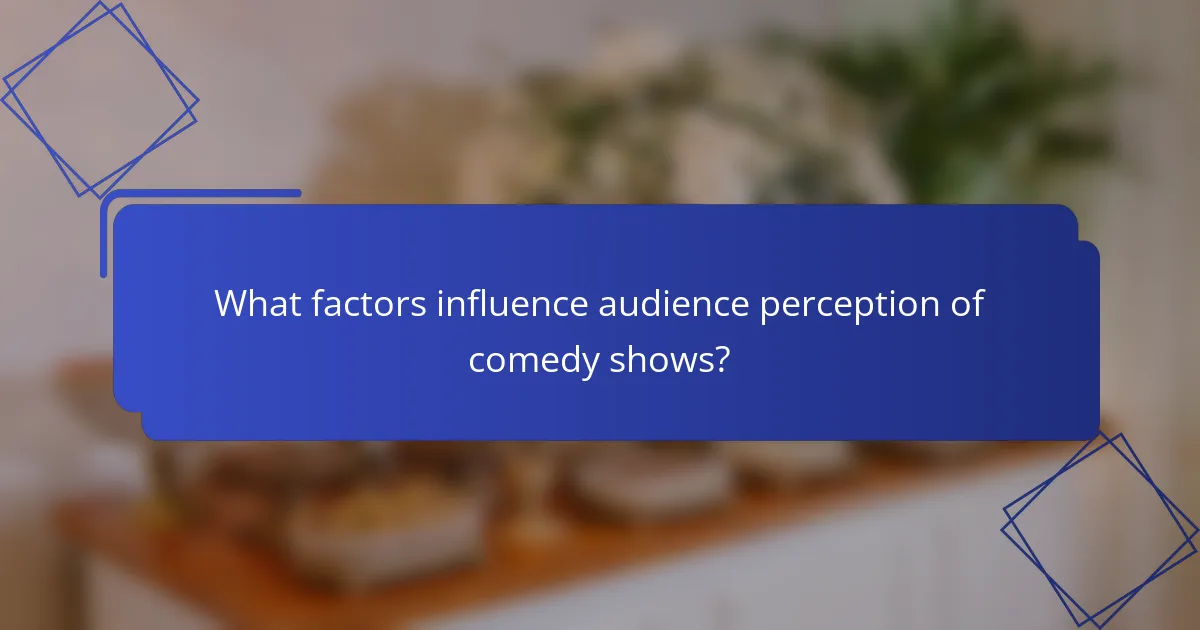
What factors influence audience perception of comedy shows?
Audience perception of comedy shows is shaped by various factors, including comedian popularity, show format, and the overall venue experience. These elements can significantly impact how humor is received and appreciated by attendees.
Comedian popularity affects audience expectations
The popularity of a comedian can set high expectations for the audience before the show even begins. Well-known comedians often draw larger crowds, and attendees may anticipate a certain level of quality based on the comedian’s previous performances or reputation.
For example, a comedian with a strong social media presence or a history of sold-out shows may create excitement and eagerness among fans. Conversely, lesser-known comedians might face skepticism or lower expectations, which can influence how their material is received.
Show format impacts audience engagement
The format of a comedy show plays a crucial role in maintaining audience engagement throughout the performance. Traditional stand-up sets, improv shows, and sketch comedy each offer different experiences that can affect how humor is perceived.
For instance, a stand-up show typically allows for a more personal connection between the comedian and the audience, fostering a shared experience. In contrast, improv shows may rely on audience interaction, which can create a dynamic atmosphere but also introduces unpredictability that might not resonate with everyone.
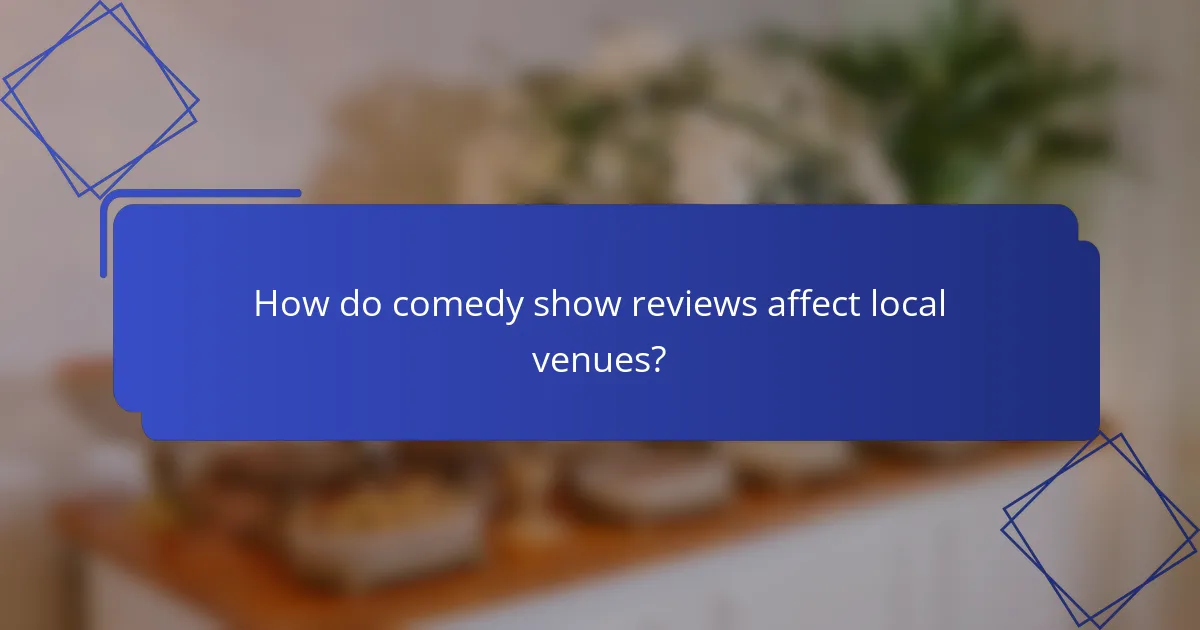
How do comedy show reviews affect local venues?
Comedy show reviews significantly influence local venues by shaping public perception and driving audience attendance. Positive feedback can enhance a venue’s reputation, while negative critiques may discourage potential customers and performers.
Positive reviews boost venue reputation
When a comedy show receives positive reviews, it can lead to increased visibility and a stronger reputation for the venue. Audiences are more likely to choose a venue with favorable ratings, often resulting in higher ticket sales and a more vibrant atmosphere.
For example, a venue that consistently hosts well-reviewed shows may attract top-tier comedians, further enhancing its appeal. This creates a cycle where good reviews lead to better acts, which in turn generate more positive feedback.
Negative reviews can deter future bookings
Negative reviews can have a lasting impact on a venue’s ability to attract both audiences and performers. A few critical comments can spread quickly, leading potential attendees to choose alternative venues instead.
For instance, if a venue receives consistent complaints about poor sound quality or uncomfortable seating, it may struggle to book popular acts. Venues should actively monitor feedback and address issues promptly to mitigate the effects of negative reviews.
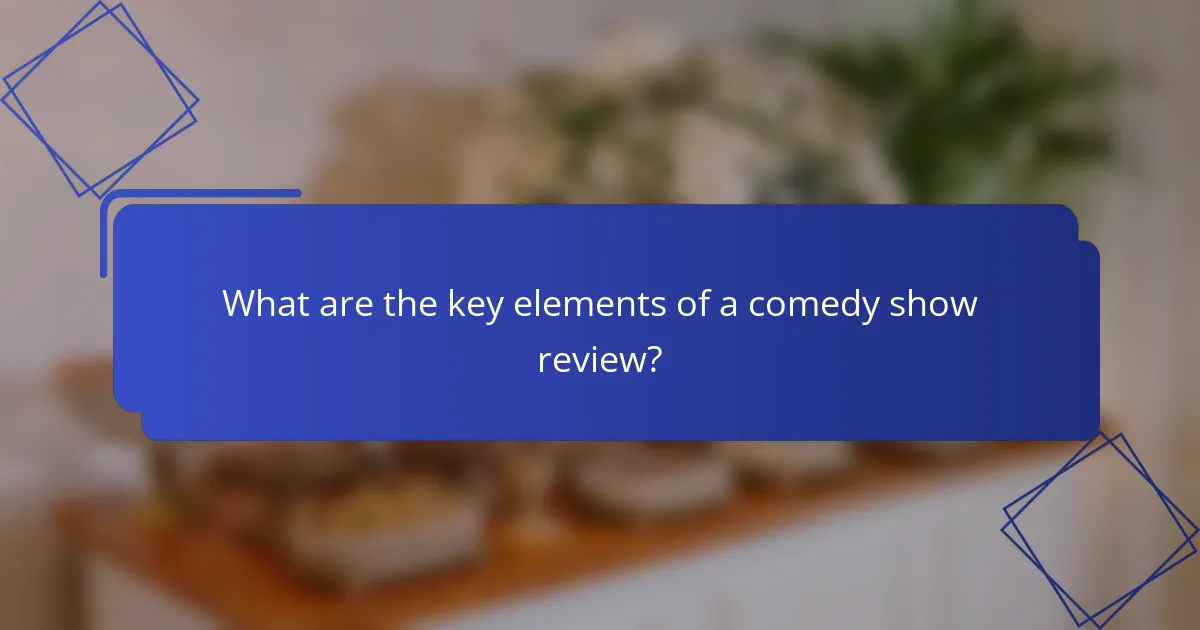
What are the key elements of a comedy show review?
A comedy show review should focus on performance quality, audience interaction, and venue amenities. These elements significantly influence the overall experience and perception of the show, shaping how both attendees and critics evaluate the performance.
Performance quality is crucial
The quality of the performance is the backbone of any comedy show review. This includes the comedian’s timing, delivery, and material originality. A strong performance can elevate a mediocre venue, while a poor act can diminish even the best settings.
When assessing performance quality, consider factors such as the comedian’s ability to engage the audience and the relevance of their jokes. Reviews often highlight standout moments or recurring themes that resonate with the audience, providing insight into the overall effectiveness of the act.
Audience interaction enhances reviews
Audience interaction is a vital component that can enhance the comedic experience. Comedians who engage with their audience often create a more dynamic and memorable show. This interaction can include responding to hecklers, incorporating audience suggestions, or even inviting attendees on stage.
In reviews, mention how well the comedian connected with the audience. A show that fosters laughter through shared experiences or spontaneous moments tends to receive higher praise. Observing the audience’s reactions can also provide valuable context for the review.
Venue amenities play a role
The venue’s amenities can significantly impact the overall experience of a comedy show. Factors such as seating comfort, sound quality, and accessibility are essential to consider. A well-designed venue can enhance the enjoyment of the performance, while a poorly equipped space can detract from it.
When reviewing a comedy show, note the venue’s atmosphere, including lighting and acoustics, as these elements contribute to the audience’s immersion in the performance. Additionally, consider practical aspects like parking availability and restroom facilities, as these can affect the overall impression of the event.
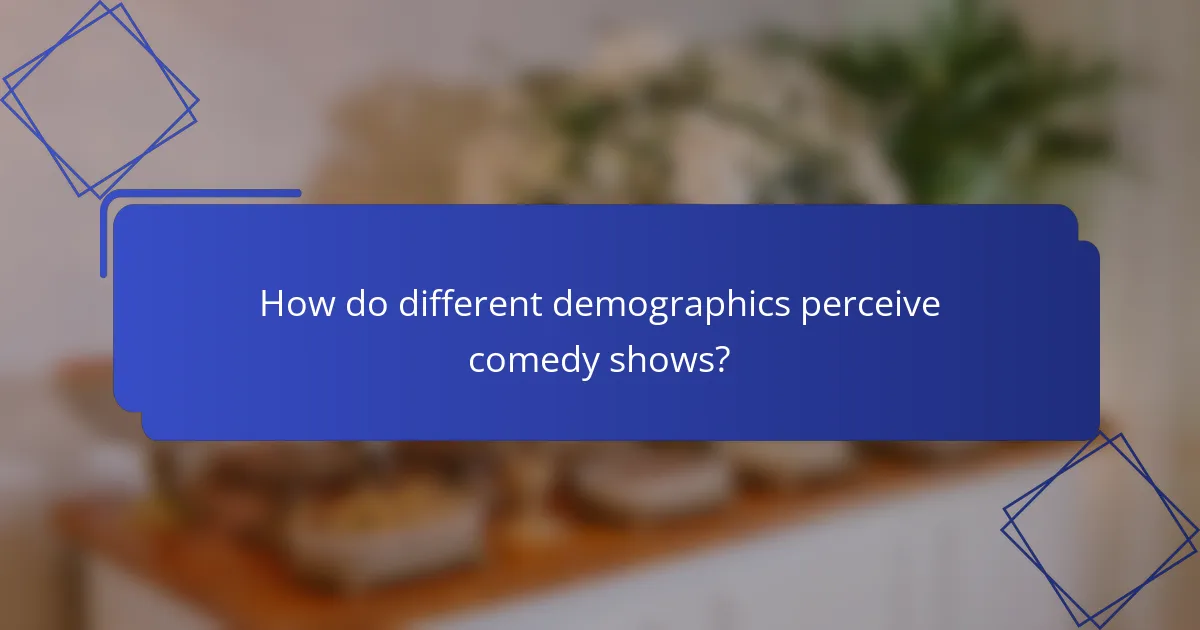
How do different demographics perceive comedy shows?
Different demographics perceive comedy shows in unique ways, influenced by factors such as age and cultural background. Understanding these perceptions can help comedians and venues tailor their performances to better resonate with diverse audiences.
Age influences humor preferences
Age significantly affects humor preferences, with younger audiences often gravitating towards more contemporary and edgy styles, while older demographics may prefer classic or situational comedy. For example, millennials and Gen Z might enjoy humor that incorporates social media references, whereas baby boomers may appreciate traditional stand-up routines.
Comedians should consider these generational differences when crafting their material. A show that blends various styles can appeal to a broader age range, ensuring that everyone finds something to enjoy. Venues can also curate lineups that reflect the predominant age group of their audience.
Cultural background shapes comedic interpretation
Cultural background plays a crucial role in how comedy is interpreted and appreciated. Jokes that resonate with one cultural group may not translate well to another, leading to misunderstandings or offense. For instance, humor that relies on specific cultural references may be lost on audiences unfamiliar with those contexts.
Comedians should be mindful of the cultural diversity within their audience. Incorporating universally relatable themes while being sensitive to cultural nuances can enhance audience engagement. Venues can facilitate this by promoting shows that celebrate various cultural perspectives, attracting a wider audience and fostering inclusivity.
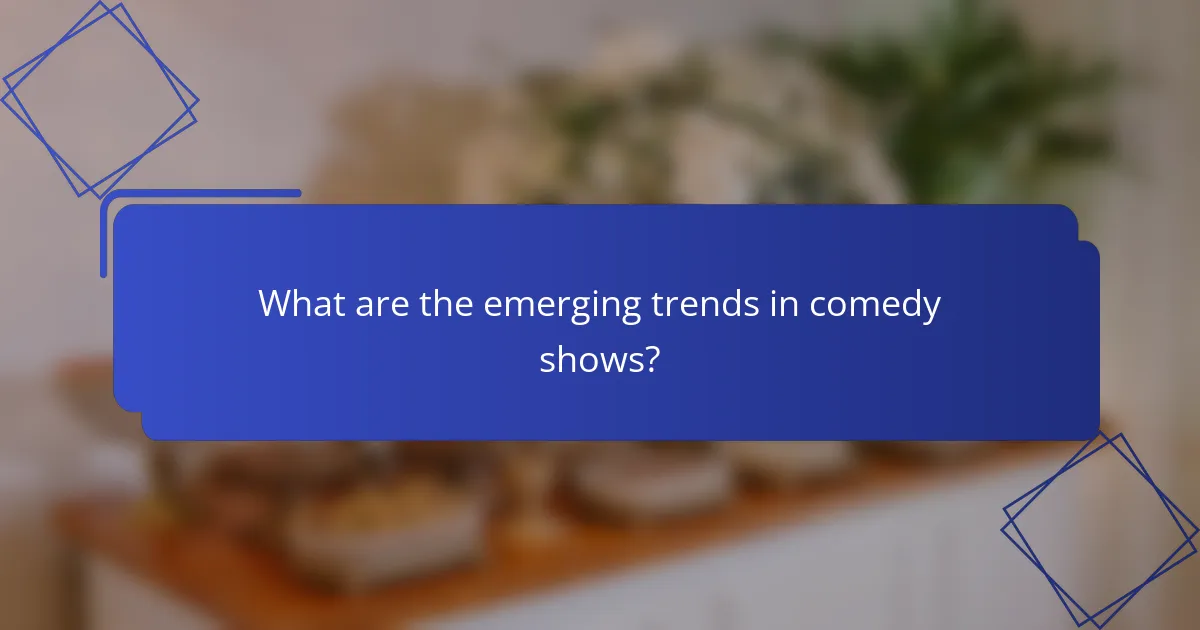
What are the emerging trends in comedy shows?
Emerging trends in comedy shows reflect changing audience preferences and technological advancements. Notably, virtual performances and a focus on inclusivity are reshaping the comedy landscape, making it more accessible and diverse.
Virtual comedy shows are gaining popularity
Virtual comedy shows have surged in popularity, particularly since the pandemic. These online performances allow comedians to reach wider audiences without geographical limitations, often resulting in increased ticket sales and engagement.
Platforms like Zoom and social media are commonly used for hosting virtual shows, providing comedians with tools to interact with audiences in real-time. This format can also lower costs for both performers and attendees, as travel and venue expenses are minimized.
Inclusivity in comedy is becoming essential
Inclusivity in comedy is increasingly recognized as vital for connecting with diverse audiences. Comedians are now more aware of the importance of representing various backgrounds, cultures, and perspectives in their material.
This trend encourages the development of comedy that resonates with a broader range of experiences, fostering a sense of belonging among audience members. Comedy festivals and local venues are actively promoting diverse lineups, which can enhance community engagement and support for underrepresented voices.
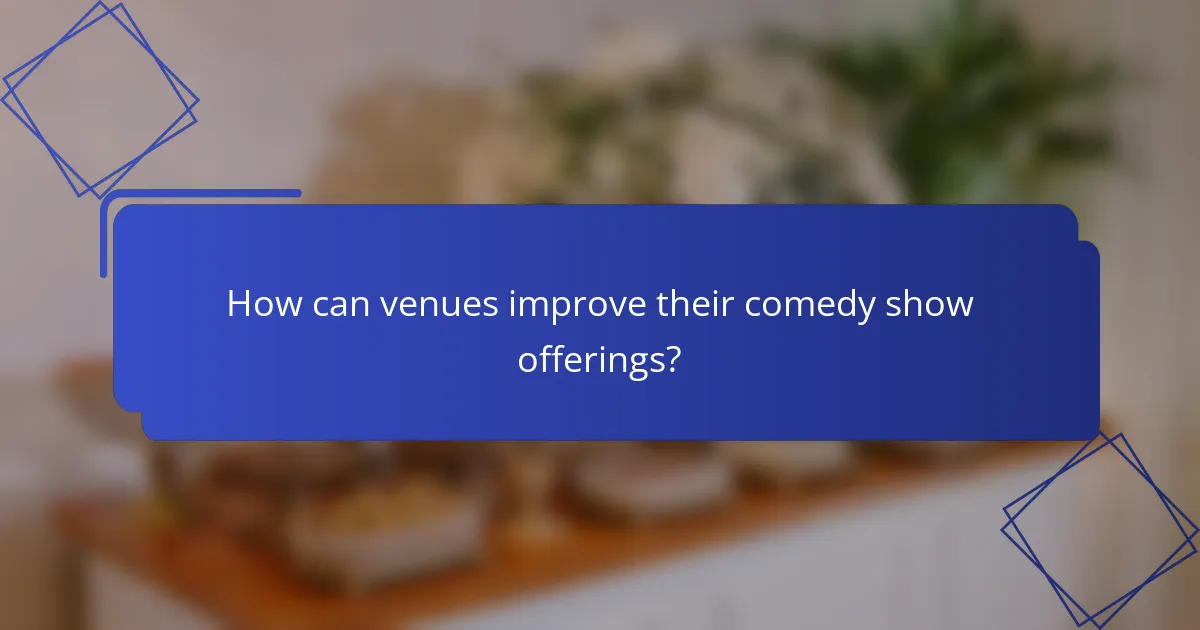
How can venues improve their comedy show offerings?
Venues can enhance their comedy show offerings by focusing on sound and lighting quality, as well as curating diverse lineups. These improvements not only elevate the audience’s experience but also attract a broader range of attendees, ultimately boosting ticket sales and venue reputation.
Enhancing sound and lighting improves experience
Quality sound and lighting are crucial for creating an engaging atmosphere during comedy shows. Venues should invest in professional audio systems and adjustable lighting to ensure that every punchline is heard clearly and the mood is set appropriately.
For instance, using directional microphones can minimize background noise, while dimmable lights can help focus the audience’s attention on the performer. Venues might consider conducting regular equipment checks and upgrades to maintain high standards.
Curating diverse lineups attracts wider audiences
Offering a variety of comedic styles and backgrounds in lineups can significantly broaden audience appeal. Venues should aim to include comedians from different cultures, genders, and comedic genres to attract a more diverse crowd.
For example, hosting themed nights or open mic events can introduce new talent and keep the programming fresh. This approach not only enhances the audience’s experience but also fosters a sense of community and inclusivity, encouraging repeat visits.
